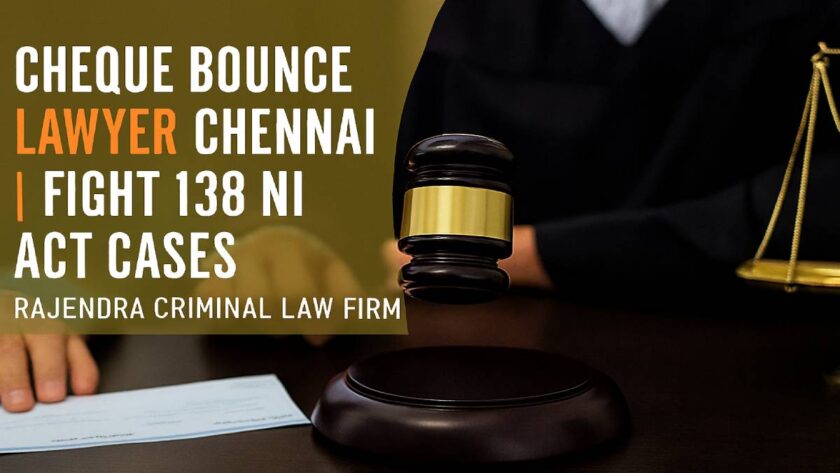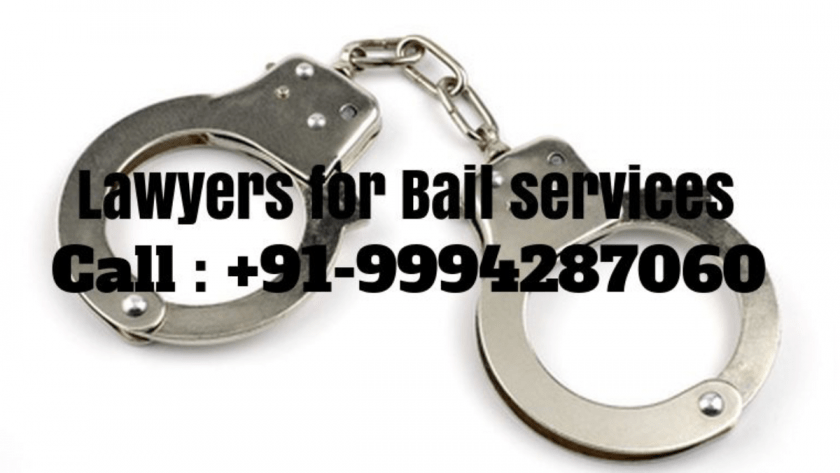ICheque Bounce Lawyer Chennai – n India, cheque bounce cases are among the most common financial disputes faced by individuals, business owners, and companies. When a cheque issued by someone is dishonoured due to insufficient funds or other reasons, it can lead to serious legal consequences under Section 138 of the Negotiable Instruments Act, 1881 (NI Act).
At Rajendra Criminal Law Firm, our dedicated team of cheque bounce lawyers in Chennai provides strong legal representation for both complainants and accused persons. We help our clients handle the complexities of Section 138 NI Act cases with confidence and clarity.
Cheque Bounce Lawyer Chennai | Fight 138 NI Act Cases – Rajendra Criminal Law Firm

What Is Section 138 of the NI Act?
Section 138 of the Negotiable Instruments Act makes it a criminal offence to issue a cheque that bounces due to insufficient funds or if the payment is stopped intentionally. The law aims to promote trust and reliability in financial transactions made through cheques.
In simple terms, if a person issues a cheque that fails to clear, and they fail to make payment within 15 days after receiving a legal notice, they can face criminal prosecution.
When Does a Cheque Bounce Become a Legal Offence?
A cheque bounce does not automatically become a criminal offence. Certain conditions must be met:
- The cheque must be issued for discharging a legally enforceable debt or liability.
- The cheque must be presented to the bank within three months from the date of issue.
- The cheque must be returned unpaid due to insufficient funds or payment stopped by the drawer.
- The payee must send a legal notice to the drawer within 30 days of receiving the cheque return memo.
- If the drawer fails to make the payment within 15 days of receiving the notice, a case can be filed under Section 138.
At Rajendra Criminal Law Firm, we ensure every procedural step is followed accurately to protect your legal rights.
Common Reasons for Cheque Bounce
Cheque bounce can happen due to various reasons, such as:
- Insufficient balance in the account
- Signature mismatch
- Stop payment instruction by drawer
- Account closed or frozen
- Overwriting or alteration on the cheque
- Post-dated cheque presented before due date
Regardless of the reason, once a cheque bounces, it can cause serious reputational and financial harm. That’s why our experienced cheque bounce lawyers in Chennai act quickly to manage the situation through proper legal channels.
Legal Remedies Available for Cheque Bounce
There are two main remedies available under Indian law for cheque dishonour:
- Criminal Remedy under Section 138 of the NI Act – The complainant can file a criminal complaint in a Magistrate Court to seek punishment for the accused and recovery of the cheque amount.
- Civil Remedy under Order 37 of the Civil Procedure Code (CPC) – A civil suit can be filed to recover the amount through summary proceedings.
Our firm often uses both strategies together to ensure faster and more effective results.
Punishment for Cheque Bounce under Section 138
The law imposes strict penalties on those who issue bounced cheques. Under Section 138 NI Act, the punishment can include:
- Imprisonment up to 2 years, or
- Fine up to twice the cheque amount, or
- Both imprisonment and fine.
Courts can also order the accused to compensate the complainant, which helps recover the due amount without unnecessary delay.
Step-by-Step Legal Process for Cheque Bounce Cases
At Rajendra Criminal Law Firm, we follow a structured legal process to ensure every case is handled efficiently:
- Cheque Dishonoured: The cheque is returned unpaid by the bank.
- Legal Notice: The payee sends a demand notice within 30 days.
- Waiting Period: The drawer has 15 days to make the payment.
- Filing the Complaint: If payment is not made, a criminal complaint is filed before the Magistrate.
- Court Proceedings: The accused is summoned, and both sides present their evidence.
- Judgment: The court decides the case, and compensation or punishment may be ordered.
We help clients through each step with careful documentation, evidence collection, and strong court representation.
How Rajendra Criminal Law Firm Helps You Win Cheque Bounce Cases
Our Chennai-based legal team specializes in cheque bounce and financial fraud litigation. Here’s how we make a difference:
- Accurate Case Assessment: We evaluate the cheque, supporting documents, and legal timelines to build a strong case.
- Drafting Legal Notice: We prepare a well-worded legal notice that complies with Section 138 requirements.
- Court Representation: Our lawyers appear before the Magistrate and handle all legal arguments effectively.
- Negotiation and Settlement: In many cases, we negotiate settlements to save time and costs for our clients.
- Execution of Judgment: We help clients enforce the judgment and recover their money through proper legal channels.
Why Choose Rajendra Criminal Law Firm for Cheque Bounce Cases in Chennai
- Specialized Expertise: We focus on criminal law and cheque dishonour litigation.
- Decades of Experience: Our advocates have extensive experience handling NI Act cases in Chennai courts.
- Result-Oriented Approach: We prioritize quick resolution and client satisfaction.
- Confidential and Ethical Practice: We maintain complete confidentiality and integrity throughout the case.
- 24×7 Legal Support: We provide prompt consultation for urgent cheque bounce and fraud cases.
Tips to Avoid Cheque Bounce Disputes
While legal remedies exist, prevention is always better. Here are some practical tips:
- Always maintain sufficient funds before issuing a cheque.
- Avoid signing blank cheques.
- Cross-check payee details and cheque date before handing it over.
- Record every transaction properly in writing or by email.
- If there is a payment issue, inform the payee beforehand.
These simple steps can save you from unnecessary legal trouble.
Cheque Bounce Cases for NRIs and Companies
Our firm also represents NRIs (Non-Resident Indians) and corporate clients in cheque bounce cases across Tamil Nadu. Many NRIs face challenges recovering money from local transactions involving bounced cheques. We offer end-to-end assistance — from issuing legal notices to filing and managing cases in Indian courts.
For companies, cheque bounce cases often involve vendor payments, client settlements, or business transactions. We assist in drafting legal notices, preparing affidavits, and defending cases under corporate policies and compliance standards.
Defending Accused Persons in Cheque Bounce Cases
If someone accuses you of cheque bounce, stay calm. There are several legal defences available:
- The drawer did not issue the cheque for a legally enforceable debt.
- The amount claimed is incorrect or disputed.
- The cheque was issued as a security, not as payment.
- The notice was sent after the statutory time limit.
- The signature or cheque details were tampered with.
Our criminal lawyers in Chennai carefully analyze every aspect of your case to identify strong defences and protect your rights.
Documents Required for Cheque Bounce Cases
To build a strong case, both complainants and accused must prepare certain documents:
- Original bounced cheque
- Bank return memo
- Copy of legal notice and postal receipts
- Proof of delivery of notice
- Bank statement or invoices showing transaction details
We help clients organize and present all required evidence in a systematic manner before the court.
Timeline for Cheque Bounce Cases in Chennai
Typically, cheque bounce cases may take 6 to 12 months for completion, depending on the court’s schedule and the complexity of the matter. However, with proper legal management, we help clients achieve faster outcomes through settlement or mediation.
Role of Mediation in Cheque Bounce Disputes
Mediation is becoming an effective tool in resolving cheque bounce cases. It allows both parties to discuss and settle the matter outside court under legal supervision. Our firm encourages clients to consider mediation wherever possible to save time and maintain business relationships.
Frequently Asked Questions
Section 138 of the NI Act deals with the offence of cheque dishonour. If a cheque is returned unpaid due to insufficient funds, account closure, or stop payment, it becomes a criminal offence. The court can punish the drawer with imprisonment of up to two years, a fine up to twice the cheque amount, or both.
After a cheque bounces, the payee must send a legal notice to the drawer within 30 days. If the drawer fails to pay within 15 days of receiving the notice, the complainant can file a case before the Magistrate within 30 days after the notice period expires. Timely action is essential to maintain the case’s validity.
Yes, both NRIs and registered companies can file or defend cheque bounce cases in India through authorized representatives. At Rajendra Criminal Law Firm, our lawyers assist clients remotely by preparing legal notices, affidavits, and court filings while ensuring full legal compliance.
An accused can claim that the cheque was issued as a security, not for debt payment; the amount is disputed; the cheque was forged or misused; or the legal notice was not properly served. You must support each defence with proper evidence and documents.
A cheque bounce lawyer drafts the legal notice, files or defends the case, presents evidence, and negotiates settlements when possible. At Rajendra Criminal Law Firm, we ensure swift, strategic, and result-oriented representation for both complainants and accused.
Conclusion: Take Legal Action with Confidence
Cheque bounce cases can be stressful and time-consuming, but with the right legal guidance, you can handle them effectively. At Rajendra Criminal Law Firm, we provide dedicated legal support for complainants and accused individuals in Chennai. Our goal is to secure justice, recover your money, and restore your peace of mind.
If you are facing a cheque bounce issue or need to file or defend a case under Section 138 of the NI Act, contact Rajendra Criminal Law Firm today. With our expertise, you can confidently fight your case and protect your legal rights at every step.
Read More
- Expert Bail Lawyer in Chennai | Urgent Bail & Anticipatory Bail
- Unlock Freedom: Expert Criminal Defence Lawyers in Chennai – Top Advocates for Serious Cases
- India’s New Criminal Laws: BNS & BNSS Explained | Legal Support & Top Lawyers
- Civil Suit Process in District Courts – How Long, How Hard, How to Win – Legal Consultant
- Fast Track Courts for Rape and POCSO: What the Accused and Victims Must Know
- Negotiable Instruments Act, 1881 — Full text on India Code portal





